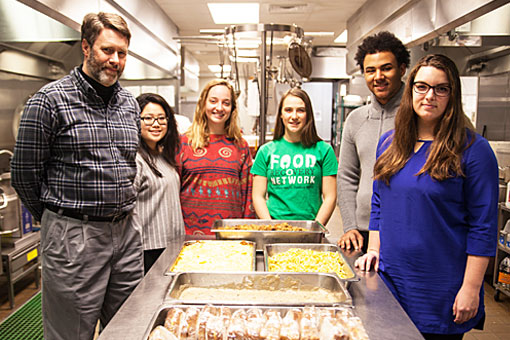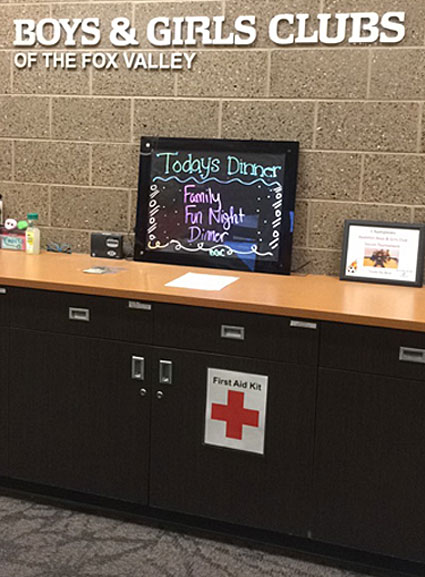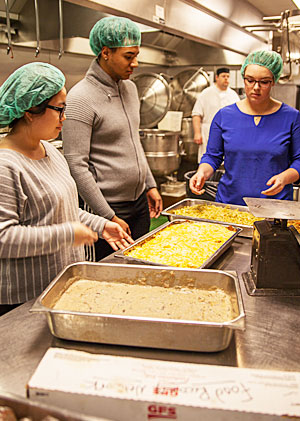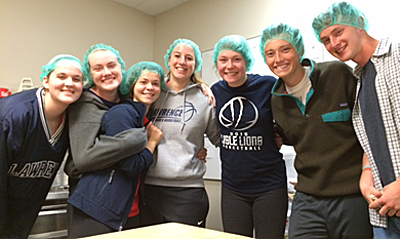An old English proverb claims the way to a man’s heart is through his stomach.
Lawrence University senior and Servant Leader Fellow Shang Li is applying a similar philosophy not for affection, but to improve the lives of hundreds of area residents.
A product of Lawrence’s innovation and entrepreneurship program, Food for Fox is the brainchild of Shang, Rachel Gregory and Malcolm Lunn-Craft and run with the help of the Lawrence Food Recovery Network team to reduce food waste while also providing a healthy meal for clients of two area non-profit organizations, Harbor House Domestic Abuse Shelter and the Fox Cities Boys and Girls Club.

With the help of various student groups of volunteers — athletes, fraternity and sorority members, residents of theme houses and passionate individuals — unused food is collected from Andrew Commons, the Lawrence dining area, several evenings three weeks a month for twice-a-week deliveries of between 50 and 100 pounds of food to Harbor House. The collection the last week of the month is earmarked for a meal for children and their families at the Fox Cities Boys and Girls Club.
Beyond simple nutrition, Food for Fox’s goal is to support education of needy children through these donated meals.
“Food is a very powerful thing,” said Li. “We want to partner with local organizations to provide educational sessions for the children and their families on the importance of establishing healthy eating habits, especially at a young age.”
Gregory was drawn to Food for Fox in part because of her interests in sustainability.
“We waste an abundance of food, while many families in our own community go hungry or do not have access to a reliable supply of nutritious foods,” said Gregory, an environmental studies major from Plano, Texas. “We are melding two problems together to create a solution.”

As of the end of February, the Boys & Girls Club had served 230 meals courtesy of the Food for Fox program.
“The biggest benefit of this program is being able to open the meal up to our member’s families,” said Holly Purgett, Healthy Habits Food Program Coordinator at the Boys and Girls Club. “Socially speaking, this event encourages families to have a meal together and spend quality time with one another on a Friday night. Our kids are proud to bring their parents, siblings and grandparents to the club and show them where they spend much of their time.
“Although we receive certain reimbursements, they do not cover all of our food program expenses,” Purgett added. “Having a meal donated, even once a month, helps with those non-covered expenses.”
Li was initially inspired by a Facebook video she saw two years ago about the Food Recovery Network, which prompted her to help establish a campus chapter — one of the first two in the state of Wisconsin — in the spring of 2014.
“That Facebook video really touched my heart,” said Li, a government and history major from Tianjin, China. “I was fascinated with how simple procedures and a support system can transform food waste into warm, nutritious meals for people in need.”
“I envision LU Food Recovery Network along with Food for Fox being run by generations of Lawrentians because there is always a demand for food and there is always a platform that will allow our students to shine as servant leaders.”
— Shang Li ’16
In its first year of operation (May 2014- June 2015), the Food Recovery Network collected more than 5,000 pounds of leftovers, which were shared with its initial Fox Cities organizations, Loaves & Fishes and Homeless Connection. When those partnerships dissolved for various reasons, Li proposed the Food for Fox idea last fall to the Food Recovery Network’s new leadership team, Sarah Diamond and Lindsay Holsen. Harbor House and the Boys and Girls Club became the new beneficiaries.
“We are extremely appreciative of the Boys & Girl’s Club for their willingness to collaborate with Food Recovery Network and Food for Fox to create an event that has a lot of potential as it continues to build awareness, promote sustainability and provide meaningful meals to kids in need,” said Holsen, a Servant Leader Fellow who joined the Food Recovery Network board in 2014 and became co-president last April.

Like Li, Gregory and Holsen, Diamond is passionate about food, maximizing its use and reducing its waste. She sees the collaboration between the Food Recovery Network and Food for Fox as an ideal vehicle to accomplish those goals.
“Food is a topic that is largely under discussed in daily life, especially among those that have enough of it,” said Diamond, a junior from Winchester, Mass., who worked with a group that focused on food, farming and hunger in the Boston area while in high school. “The fact that 40 percent of food produced in this country is thrown away while at the same time one in seven Americans are food insecure is simply not okay.”
The students involved see the two programs growing and expanding their reach in the years ahead, including operating during the summer and winter term break.
“We want to be a support system to low-income families and their children throughout the year,” said Li, who plans to pursue graduate studies in social innovations post-Lawrence. “I envision LU Food Recovery Network along with Food for Fox being run by generations of Lawrentians because there is always a demand for food and there is always a platform that will allow our students to shine as servant leaders.”
Gregory sees great potential for the Food for Fox program, especially in the education realm.
“I hope over the next five to 10 years, the program increases awareness to food-related issues. We want to introduce the kids to delicious healthy foods they might not have tried before, which will give way to healthy life-long eating habits. Economically, Food for Fox could even increase economic efficiency among our donors as they begin to take note of which foods are often left over. In our work this term, we tried to build a simple, logical model that can be applied to many different locations so that the program expands throughout the Fox Valley, Wisconsin and the Midwest.”

Julie Severance, general manager of Bon Appetit, has served as the advisor for Food Recovery Network since its inception while Mark Jenike, Pieper Family Professor of Servant Leadership and associate professor of anthropology, joined the team as faculty advisor earlier this year. John Brandenberger, Alice G. Chapman Professor Emeritus of Physics, Adam Galambos, Dwight and Marjorie Peterson Professor of Innovation and associate professor of economics, and Gary Vaughan, coordinator of the innovation and entrepreneurship program, have served as mentors to the Food for Fox program.
About Lawrence University
Founded in 1847, Lawrence University uniquely integrates a college of liberal arts and sciences with a nationally recognized conservatory of music, both devoted exclusively to undergraduate education. It was selected for inclusion in the book “Colleges That Change Lives: 40 Schools That Will Change the Way You Think About College” and Fiske’s Guide to Colleges 2016. Engaged learning, the development of multiple interests and community outreach are central to the Lawrence experience. Lawrence draws its 1,500 students from nearly every state and more than 50 countries.